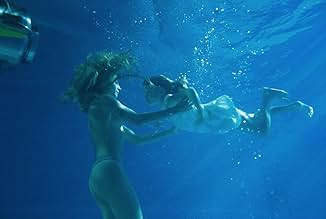Various lives converge on an isolated island, all connected by an author whose novel has become inextricably entwined with his own life.Various lives converge on an isolated island, all connected by an author whose novel has become inextricably entwined with his own life.Various lives converge on an isolated island, all connected by an author whose novel has become inextricably entwined with his own life.
- Awards
- 11 wins & 18 nominations total
María Álvarez
- Enfermera
- (as María Alvarez)
Javier Coromina
- Camarero Chiringuito
- (as Javier Corominas)
Alesandra Álvarez
- Luna 1 año
- (as Alesandra Alvarez)
José Ferreira
- Emplastro
- (uncredited)
- Director
- Writer
- All cast & crew
- Production, box office & more at IMDbPro
Featured reviews
I found this film absolutely terrific. Ik know there's a lot of sex in it and yes, there are a lot of suspicious coincidences, but I looked past that.
For starters, I loved the story, it wasn't boring at all, despite what some may say. It was a sort of twisty fairytale to me, just like 'Los Amantes del Circulo Polàr' was. I love good fairy tales!
The acting was very good by most actors (I love you Najwa!), and good by the others. Even the girl that played Luna was convincing.
The film has a lot of explicit scenes (sexual and non-sexual) but besides from that Médem accomplishes to put a lot of suggestion in it (sexual and non-sexual). If you watch it attentively and past merely what you see, you will notice the subtlety of the characters and story.
Last of all i would like to say that the English title (Sex and Lucia) is an abomination to the original title (Lucia y el Sexo). The word are the same, but the word order has flipped, which gives the title a whole other meaning, to my opinion. The film is about Lucia and the meaning sex has in her life and the life of others. It is not about sex and the way Lucia handles with it. The meaning of film titles is often lost in translation (no pun intended). Why can't American (and other) people keep the original title? We can in Belgium.
A la proxima
For starters, I loved the story, it wasn't boring at all, despite what some may say. It was a sort of twisty fairytale to me, just like 'Los Amantes del Circulo Polàr' was. I love good fairy tales!
The acting was very good by most actors (I love you Najwa!), and good by the others. Even the girl that played Luna was convincing.
The film has a lot of explicit scenes (sexual and non-sexual) but besides from that Médem accomplishes to put a lot of suggestion in it (sexual and non-sexual). If you watch it attentively and past merely what you see, you will notice the subtlety of the characters and story.
Last of all i would like to say that the English title (Sex and Lucia) is an abomination to the original title (Lucia y el Sexo). The word are the same, but the word order has flipped, which gives the title a whole other meaning, to my opinion. The film is about Lucia and the meaning sex has in her life and the life of others. It is not about sex and the way Lucia handles with it. The meaning of film titles is often lost in translation (no pun intended). Why can't American (and other) people keep the original title? We can in Belgium.
A la proxima
10Core242
The earlier film by Julio Médem (Lovers of the Arctic Circle) is a prelude to the kind of cinematography that this Spanish film director/writer presents here. I have read most of the other comments, but they don't do justice to it, mainly because of the lack of understanding the original tongue of this film. The screenplay is excellent, full of metaphors and a rich use of very carefully chosen words. People who consider this film just an excuse for depicting sex scenes as the highlight of the movie are pretty much clueless. It is more than that, it is the complex storytelling that tangles the characters in this movie and the way that is told. Compelling and breath-taking. A must see.
(8/10) Refreshing, delightful, sexy. moving and thought-provoking movie from Spain. Not really porn (as the title might suggest) although there is some very artistic explicitness. It is movies like this one that remind us that European cinema can scale the emotional dilemmas and mountains of a story where other films look at a storyline in terms of physical developments. Lucia, a young waitress in Madrid, falls completely in love with a writer. After a period of blissful togetherness, something from his past pulls him in two directions. We are caught up in his moral dilemma, of not wanting to lose the wonderful gift he has found and yet not wanting to be untrue to himself. The semi-autobiographical novel he is writing pulls together the story and the emotions and hopes of the characters and introduces ideas that enable them to heal some of their hurt. A central idea is that of finding a hole (symbolically on the sandy beach) where, after reaching the end of the story, you can jump back into the middle. That way you can try an make things turn out better ("If you give me time", says Lorenzo, Lucia's boyfriend.) A more mature and rounded work than the Director's earlier "Lovers of the Arctic Circle", Sex and Lucia combines wonderful acting, a great story, innovative cinema and spine-tingly beautiful photography. One of my favourite films of the year.
Written reality. I had the unexpected pleasure of seeing this soon after Ruiz's Proust. Both about writers creating a life.
Time folding. Narrative layers.
The three sisters from 'Alice in Wonderland,' here named Alsi/Elana, Lucia (the Alice, an anagram, in fact one that Carroll used) and Belin. The story is to Alice, for Alice, about Alice and generates the world that Alice lives in. The lighthouse and hole.
Its less than intelligent in the level of the story: lust drives meaning, but that's because the written novel is at that vulgar level. This film starts slow and ordinary, just as the novel within. But we soon weave all sorts of ambiguous narrative threads, each creating the other. The last half of the film is a bedtime story, a novel, a suicide note, a coma-induced dream, a recipe, an internet communication, a climax-induced hallucination, a blindfolded taste.
A man loves three women. Another man mirrors him. Lots of coupling, ethereal angst,
Two of the sisters plus the author (and his double), all possibly dead (all possibly fictional), on the island of conception. And the story starts again halfway.
Some lightly nuanced direction here. Endearment without cloying. The only thing in this film that is not sensually romantic is that the computer is a PeeCee and not a Mac. You'd think they'd know.
Ted's Evaluation -- 3 of 4: Worth watching.
Time folding. Narrative layers.
The three sisters from 'Alice in Wonderland,' here named Alsi/Elana, Lucia (the Alice, an anagram, in fact one that Carroll used) and Belin. The story is to Alice, for Alice, about Alice and generates the world that Alice lives in. The lighthouse and hole.
Its less than intelligent in the level of the story: lust drives meaning, but that's because the written novel is at that vulgar level. This film starts slow and ordinary, just as the novel within. But we soon weave all sorts of ambiguous narrative threads, each creating the other. The last half of the film is a bedtime story, a novel, a suicide note, a coma-induced dream, a recipe, an internet communication, a climax-induced hallucination, a blindfolded taste.
A man loves three women. Another man mirrors him. Lots of coupling, ethereal angst,
Two of the sisters plus the author (and his double), all possibly dead (all possibly fictional), on the island of conception. And the story starts again halfway.
Some lightly nuanced direction here. Endearment without cloying. The only thing in this film that is not sensually romantic is that the computer is a PeeCee and not a Mac. You'd think they'd know.
Ted's Evaluation -- 3 of 4: Worth watching.
Stories told in a so-called "magical realism" style like this film can be very tricky. The story and the characters need to be very strong to sustain all the twists of the plot and I don't think this was pulled off here. I was disappointed, as I'd enjoyed Medem's previous film Los Amantes del Circulo Polar, where the passionate love story seemed a lot more genuine and the tragic ending seemed to fit better with the theme of fate playing with people's lives than Lucia y el sexo's tragic-to-happy contortions.
Also, while the female characters were all charming and sexy, the male roles were really poor and unconvincing. What on earth did Lucia see in Lorenzo? There isn't enough to justify her endurance and patience with him. Their whole love story seems artificial from the inception, it seems there was too much work on the symbolism of their relationship - the tormented writer and storyteller, the reader and savior (Lucia as a ray of sunshine) - rather than on the real intensity of feeling between two people. The sex scenes are too stylish and sleek to be really passionate. Everyone is good looking and well dressed, they live in nice apartments, exist in a bubble where the society around them doesn't seem to affect them, this is obviously purposefully so and ideally you wouldn't mind that lack of realism if the story was engrossing enough, which it isn't.
The entire plot seems to revolve around the concept of the ability to deal with tragic fateful events by rewriting, literally and metaphorically, one's own life story. But the final optimism comes across as too artificial. The plot does not resolve the fate of the child Luna, Lorenzo's daughter. The tragedies seem more like a prop, a trick to demonstrate how love can conquer guilt, remorse and failure. They're not given enough weight. People slash their wrists or throw themselves under buses easier than they cry, then we're supposed to believe they can just forget and forgive and live happily ever after.
The director says he wanted to make everything "light" in this film, after the experience with the previous one. But I think he overdid it! There is a bit too much of the French 'Amelie' in Lucia's character, she is more like a beautiful fairy than a real person. Elena, too, is more a symbol of caring and nurturing (motherhood, cooking, taking care of Lucia) than a real grieving mother. Her lack of anger and bitterness is not very believable. The whole escapist symbol of the floating island becomes annoying after a while. It functions on the characters like a drug inducing apathy and oblivion, more of a way of avoiding pain than confronting it. But it's not that, it's the way in which it's presented and wrapped up at the end that really disappoints - too fancy and too abstract to really work.
It's not a bad film. It's full of eye candy - the spectacularly gorgeous Paz Vegas, the island, the photography - and it is well directed and well acted overall. But without all that, the story itself wouldn't really be worth much.
Also, while the female characters were all charming and sexy, the male roles were really poor and unconvincing. What on earth did Lucia see in Lorenzo? There isn't enough to justify her endurance and patience with him. Their whole love story seems artificial from the inception, it seems there was too much work on the symbolism of their relationship - the tormented writer and storyteller, the reader and savior (Lucia as a ray of sunshine) - rather than on the real intensity of feeling between two people. The sex scenes are too stylish and sleek to be really passionate. Everyone is good looking and well dressed, they live in nice apartments, exist in a bubble where the society around them doesn't seem to affect them, this is obviously purposefully so and ideally you wouldn't mind that lack of realism if the story was engrossing enough, which it isn't.
The entire plot seems to revolve around the concept of the ability to deal with tragic fateful events by rewriting, literally and metaphorically, one's own life story. But the final optimism comes across as too artificial. The plot does not resolve the fate of the child Luna, Lorenzo's daughter. The tragedies seem more like a prop, a trick to demonstrate how love can conquer guilt, remorse and failure. They're not given enough weight. People slash their wrists or throw themselves under buses easier than they cry, then we're supposed to believe they can just forget and forgive and live happily ever after.
The director says he wanted to make everything "light" in this film, after the experience with the previous one. But I think he overdid it! There is a bit too much of the French 'Amelie' in Lucia's character, she is more like a beautiful fairy than a real person. Elena, too, is more a symbol of caring and nurturing (motherhood, cooking, taking care of Lucia) than a real grieving mother. Her lack of anger and bitterness is not very believable. The whole escapist symbol of the floating island becomes annoying after a while. It functions on the characters like a drug inducing apathy and oblivion, more of a way of avoiding pain than confronting it. But it's not that, it's the way in which it's presented and wrapped up at the end that really disappoints - too fancy and too abstract to really work.
It's not a bad film. It's full of eye candy - the spectacularly gorgeous Paz Vegas, the island, the photography - and it is well directed and well acted overall. But without all that, the story itself wouldn't really be worth much.
Did you know
- TriviaThey say "the island" many times but they don't say its name. It is in fact, the tiny island of Formentera.
- GoofsIn one scene,the nipples of nude female are not same.
- Crazy creditsCredits scroll in the opposite direction.
- Alternate versionsThe US cut removes most of the frontal nudity and runs approximately 2 minutes shorter.
- ConnectionsFeatured in Brows Held High: Room in Rome (2013)
- SoundtracksUn Rayo de Sol
Written by Daniel Vangarde (as Vangarde), Claude Carrère and Amado Jaén (as Jaen)
(c) Bleu Blanc Rouge Editions Soc - Editions Productions Zagora
Ediciones Musicales Clipper's, S.L.
Details
Box office
- Gross US & Canada
- $1,594,779
- Opening weekend US & Canada
- $47,591
- Jul 14, 2002
- Gross worldwide
- $7,640,680
- Runtime
- 2h 8m(128 min)
- Color
- Sound mix
- Aspect ratio
- 2.35 : 1
Contribute to this page
Suggest an edit or add missing content




















